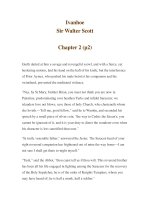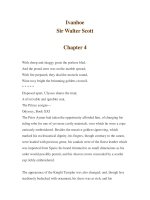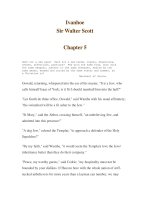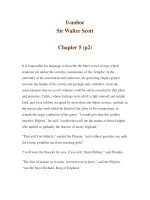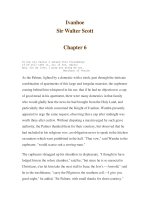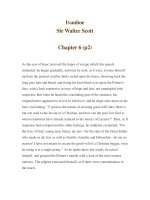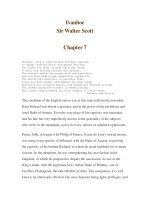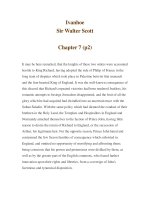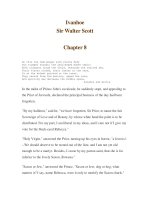Ivanhoe -Sir Walter Scott- Chapter 23 pps
Bạn đang xem bản rút gọn của tài liệu. Xem và tải ngay bản đầy đủ của tài liệu tại đây (32.95 KB, 11 trang )
Ivanhoe
Sir Walter Scott
Chapter 23
Nay, if the gentle spirit of moving words
Can no way change you to a milder form,
I'll woo you, like a soldier, at arms' end,
And love you 'gainst the nature of love, force you.
Two Gentlemen of Verona
The apartment to which the Lady Rowena had been introduced was fitted up
with some rude attempts at ornament and magnificence, and her being
placed there might be considered as a peculiar mark of respect not offered to
the other prisoners. But the wife of Front-de-Boeuf, for whom it had been
originally furnished, was long dead, and decay and neglect had impaired the
few ornaments with which her taste had adorned it. The tapestry hung down
from the walls in many places, and in others was tarnished and faded under
the effects of the sun, or tattered and decayed by age. Desolate, however, as
it was, this was the apartment of the castle which had been judged most
fitting for the accommodation of the Saxon heiress; and here she was left to
meditate upon her fate, until the actors in this nefarious drama had arranged
the several parts which each of them was to perform. This had been settled
in a council held by Front-de-Boeuf, De Bracy, and the Templar, in which,
after a long and warm debate concerning the several advantages which each
insisted upon deriving from his peculiar share in this audacious enterprise,
they had at length determined the fate of their unhappy prisoners.
It was about the hour of noon, therefore, when De Bracy, for whose
advantage the expedition had been first planned, appeared to prosecute his
views upon the hand and possessions of the Lady Rowena.
The interval had not entirely been bestowed in holding council with his
confederates, for De Bracy had found leisure to decorate his person with all
the foppery of the times. His green cassock and vizard were now flung aside.
His long luxuriant hair was trained to flow in quaint tresses down his richly
furred cloak. His beard was closely shaved, his doublet reached to the
middle of his leg, and the girdle which secured it, and at the same time
supported his ponderous sword, was embroidered and embossed with gold
work. We have already noticed the extravagant fashion of the shoes at this
period, and the points of Maurice de Bracy's might have challenged the prize
of extravagance with the gayest, being turned up and twisted like the horns
of a ram. Such was the dress of a gallant of the period; and, in the present
instance, that effect was aided by the handsome person and good demeanour
of the wearer, whose manners partook alike of the grace of a courtier, and
the frankness of a soldier.
He saluted Rowena by doffing his velvet bonnet, garnished with a golden
broach, representing St Michael trampling down the Prince of Evil. With
this, he gently motioned the lady to a seat; and, as she still retained her
standing posture, the knight ungloved his right hand, and motioned to
conduct her thither. But Rowena declined, by her gesture, the proffered
compliment, and replied, "If I be in the presence of my jailor, Sir Knight
nor will circumstances allow me to think otherwise it best becomes his
prisoner to remain standing till she learns her doom."
"Alas! fair Rowena," returned De Bracy, "you are in presence of your
captive, not your jailor; and it is from your fair eyes that De Bracy must
receive that doom which you fondly expect from him."
"I know you not, sir," said the lady, drawing herself up with all the pride of
offended rank and beauty; "I know you not and the insolent familiarity
with which you apply to me the jargon of a troubadour, forms no apology for
the violence of a robber."
"To thyself, fair maid," answered De Bracy, in his former tone "to thine
own charms be ascribed whate'er I have done which passed the respect due
to her, whom I have chosen queen of my heart, and loadstar of my eyes."
"I repeat to you, Sir Knight, that I know you not, and that no man wearing
chain and spurs ought thus to intrude himself upon the presence of an
unprotected lady."
"That I am unknown to you," said De Bracy, "is indeed my misfortune; yet
let me hope that De Bracy's name has not been always unspoken, when
minstrels or heralds have praised deeds of chivalry, whether in the lists or in
the battle-field."
"To heralds and to minstrels, then, leave thy praise, Sir Knight," replied
Rowena, "more suiting for their mouths than for thine own; and tell me
which of them shall record in song, or in book of tourney, the memorable
conquest of this night, a conquest obtained over an old man, followed by a
few timid hinds; and its booty, an unfortunate maiden, transported against
her will to the castle of a robber?"
"You are unjust, Lady Rowena," said the knight, biting his lips in some
confusion, and speaking in a tone more natural to him than that of affected
gallantry, which he had at first adopted; "yourself free from passion, you can
allow no excuse for the frenzy of another, although caused by your own
beauty."
"I pray you, Sir Knight," said Rowena, "to cease a language so commonly
used by strolling minstrels, that it becomes not the mouth of knights or
nobles. Certes, you constrain me to sit down, since you enter upon such
commonplace terms, of which each vile crowder hath a stock that might last
from hence to Christmas."
"Proud damsel," said De Bracy, incensed at finding his gallant style
procured him nothing but contempt "proud damsel, thou shalt be as
proudly encountered. Know then, that I have supported my pretensions to
your hand in the way that best suited thy character. It is meeter for thy
humour to be wooed with bow and bill, than in set terms, and in courtly
language."
"Courtesy of tongue," said Rowena, "when it is used to veil churlishness of
deed, is but a knight's girdle around the breast of a base clown. I wonder not
that the restraint appears to gall you more it were for your honour to have
retained the dress and language of an outlaw, than to veil the deeds of one
under an affectation of gentle language and demeanour."
"You counsel well, lady," said the Norman; "and in the bold language which
best justifies bold action I tell thee, thou shalt never leave this castle, or thou
shalt leave it as Maurice de Bracy's wife. I am not wont to be baffled in my
enterprises, nor needs a Norman noble scrupulously to vindicate his conduct
to the Saxon maiden whom be distinguishes by the offer of his hand. Thou
art proud, Rowena, and thou art the fitter to be my wife. By what other
means couldst thou be raised to high honour and to princely place, saving by
my alliance? How else wouldst thou escape from the mean precincts of a
country grange, where Saxons herd with the swine which form their wealth,
to take thy seat, honoured as thou shouldst be, and shalt be, amid all in
England that is distinguished by beauty, or dignified by power?"
"Sir Knight," replied Rowena, "the grange which you contemn hath been my
shelter from infancy; and, trust me, when I leave it should that day ever
arrive it shall be with one who has not learnt to despise the dwelling and
manners in which I have been brought up."
"I guess your meaning, lady," said De Bracy, "though you may think it lies
too obscure for my apprehension. But dream not, that Richard Coeur de Lion
will ever resume his throne, far less that Wilfred of Ivanhoe, his minion, will
ever lead thee to his footstool, to be there welcomed as the bride of a
favourite. Another suitor might feel jealousy while he touched this string;
but my firm purpose cannot be changed by a passion so childish and so
hopeless. Know, lady, that this rival is in my power, and that it rests but with
me to betray the secret of his being within the castle to Front-de-Boeuf,
whose jealousy will be more fatal than mine."
"Wilfred here?" said Rowena, in disdain; "that is as true as that Front-de-
Boeuf is his rival."
De Bracy looked at her steadily for an instant.
"Wert thou really ignorant of this?" said he; "didst thou not know that
Wilfred of Ivanhoe travelled in the litter of the Jew? a meet conveyance
for the crusader, whose doughty arm was to reconquer the Holy Sepulchre!"
And he laughed scornfully.
"And if he is here," said Rowena, compelling herself to a tone of
indifference, though trembling with an agony of apprehension which she
could not suppress, "in what is he the rival of Front-de-Boeuf? or what has
he to fear beyond a short imprisonment, and an honourable ransom,
according to the use of chivalry?"
"Rowena," said De Bracy, "art thou, too, deceived by the common error of
thy sex, who think there can be no rivalry but that respecting their own
charms? Knowest thou not there is a jealousy of ambition and of wealth, as
well as of love; and that this our host, Front-de-Boeuf, will push from his
road him who opposes his claim to the fair barony of Ivanhoe, as readily,
eagerly, and unscrupulously, as if he were preferred to him by some blue-
eyed damsel? But smile on my suit, lady, and the wounded champion shall
have nothing to fear from Front-de-Boeuf, whom else thou mayst mourn for,
as in the hands of one who has never shown compassion."
"Save him, for the love of Heaven!" said Rowena, her firmness giving way
under terror for her lover's impending fate.
"I can I will it is my purpose," said De Bracy; "for, when Rowena
consents to be the bride of De Bracy, who is it shall dare to put forth a
violent hand upon her kinsman the son of her guardian the companion of
her youth? But it is thy love must buy his protection. I am not romantic fool
enough to further the fortune, or avert the fate, of one who is likely to be a
successful obstacle between me and my wishes. Use thine influence with me
in his behalf, and he is safe, refuse to employ it, Wilfred dies, and thou
thyself art not the nearer to freedom."
"Thy language," answered Rowena, "hath in its indifferent bluntness
something which cannot be reconciled with the horrors it seems to express. I
believe not that thy purpose is so wicked, or thy power so great."
"Flatter thyself, then, with that belief," said De Bracy, "until time shall prove
it false. Thy lover lies wounded in this castle thy preferred lover. He is a
bar betwixt Front-de-Boeuf and that which Front-de-Boeuf loves better than
either ambition or beauty. What will it cost beyond the blow of a poniard, or
the thrust of a javelin, to silence his opposition for ever? Nay, were Front-
de-Boeuf afraid to justify a deed so open, let the leech but give his patient a
wrong draught let the chamberlain, or the nurse who tends him, but pluck
the pillow from his head, and Wilfred in his present condition, is sped
without the effusion of blood. Cedric also "
"And Cedric also," said Rowena, repeating his words; "my noble my
generous guardian! I deserved the evil I have encountered, for forgetting his
fate even in that of his son!"
"Cedric's fate also depends upon thy determination," said De Bracy; "and I
leave thee to form it."
Hitherto, Rowena had sustained her part in this trying scene with
undismayed courage, but it was because she had not considered the danger
as serious and imminent. Her disposition was naturally that which
physiognomists consider as proper to fair complexions, mild, timid, and
gentle; but it had been tempered, and, as it were, hardened, by the
circumstances of her education. Accustomed to see the will of all, even of
Cedric himself, (sufficiently arbitrary with others,) give way before her
wishes, she had acquired that sort of courage and self-confidence which
arises from the habitual and constant deference of the circle in which we
move. She could scarce conceive the possibility of her will being opposed,
far less that of its being treated with total disregard.
Her haughtiness and habit of domination was, therefore, a fictitious
character, induced over that which was natural to her, and it deserted her
when her eyes were opened to the extent of her own danger, as well as that
of her lover and her guardian; and when she found her will, the slightest
expression of which was wont to command respect and attention, now
placed in opposition to that of a man of a strong, fierce, and determined
mind, who possessed the advantage over her, and was resolved to use it, she
quailed before him.
After casting her eyes around, as if to look for the aid which was nowhere to
be found, and after a few broken interjections, she raised her hands to
heaven, and burst into a passion of uncontrolled vexation and sorrow. It was
impossible to see so beautiful a creature in such extremity without feeling
for her, and De Bracy was not unmoved, though he was yet more
embarrassed than touched. He had, in truth, gone too far to recede; and yet,
in Rowena's present condition, she could not be acted on either by argument
or threats. He paced the apartment to and fro, now vainly exhorting the
terrified maiden to compose herself, now hesitating concerning his own line
of conduct.
If, thought he, I should be moved by the tears and sorrow of this
disconsolate damsel, what should I reap but the loss of these fair hopes for
which I have encountered so much risk, and the ridicule of Prince John and
his jovial comrades? "And yet," he said to himself, "I feel myself ill framed
for the part which I am playing. I cannot look on so fair a face while it is
disturbed with agony, or on those eyes when they are drowned in tears. I
would she had retained her original haughtiness of disposition, or that I had
a larger share of Front-de-Boeuf's thrice-tempered hardness of heart!"
Agitated by these thoughts, he could only bid the unfortunate Rowena be
comforted, and assure her, that as yet she had no reason for the excess of
despair to which she was now giving way. But in this task of consolation De
Bracy was interrupted by the horn, "hoarse-winded blowing far and keen,"
which had at the same time alarmed the other inmates of the castle, and
interrupted their several plans of avarice and of license. Of them all, perhaps,
De Bracy least regretted the interruption; for his conference with the Lady
Rowena had arrived at a point, where he found it equally difficult to
prosecute or to resign his enterprise.
And here we cannot but think it necessary to offer some better proof than the
incidents of an idle tale, to vindicate the melancholy representation of
manners which has been just laid before the reader. It is grievous to think
that those valiant barons, to whose stand against the crown the liberties of
England were indebted for their existence, should themselves have been
such dreadful oppressors, and capable of excesses contrary not only to the
laws of England, but to those of nature and humanity. But, alas! we have
only to extract from the industrious Henry one of those numerous passages
which he has collected from contemporary historians, to prove that fiction
itself can hardly reach the dark reality of the horrors of the period.
The description given by the author of the Saxon Chronicle of the cruelties
exercised in the reign of King Stephen by the great barons and lords of
castles, who were all Normans, affords a strong proof of the excesses of
which they were capable when their passions were inflamed. "They
grievously oppressed the poor people by building castles; and when they
were built, they filled them with wicked men, or rather devils, who seized
both men and women who they imagined had any money, threw them into
prison, and put them to more cruel tortures than the martyrs ever endured.
They suffocated some in mud, and suspended others by the feet, or the head,
or the thumbs, kindling fires below them. They squeezed the heads of some
with knotted cords till they pierced their brains, while they threw others into
dungeons swarming with serpents, snakes, and toads." But it would be cruel
to put the reader to the pain of perusing the remainder of this description.*
* Henry's Hist. edit. 1805, vol. vii. p. .146.
As another instance of these bitter fruits of conquest, and perhaps the
strongest that can be quoted, we may mention, that the Princess Matilda,
though a daughter of the King of Scotland, and afterwards both Queen of
England, niece to Edgar Atheling, and mother to the Empress of Germany,
the daughter, the wife, and the mother of monarchs, was obliged, during her
early residence for education in England, to assume the veil of a nun, as the
only means of escaping the licentious pursuit of the Norman nobles. This
excuse she stated before a great council of the clergy of England, as the sole
reason for her having taken the religious habit. The assembled clergy
admitted the validity of the plea, and the notoriety of the circumstances upon
which it was founded; giving thus an indubitable and most remarkable
testimony to the existence of that disgraceful license by which that age was
stained. It was a matter of public knowledge, they said, that after the
conquest of King William, his Norman followers, elated by so great a
victory, acknowledged no law but their own wicked pleasure, and not only
despoiled the conquered Saxons of their lands and their goods, but invaded
the honour of their wives and of their daughters with the most unbridled
license; and hence it was then common for matrons and maidens of noble
families to assume the veil, and take shelter in convents, not as called thither
by the vocation of God, but solely to preserve their honour from the
unbridled wickedness of man.
Such and so licentious were the times, as announced by the public
declaration of the assembled clergy, recorded by Eadmer; and we need add
nothing more to vindicate the probability of the scenes which we have
detailed, and are about to detail, upon the more apocryphal authority of the
Wardour MS.

